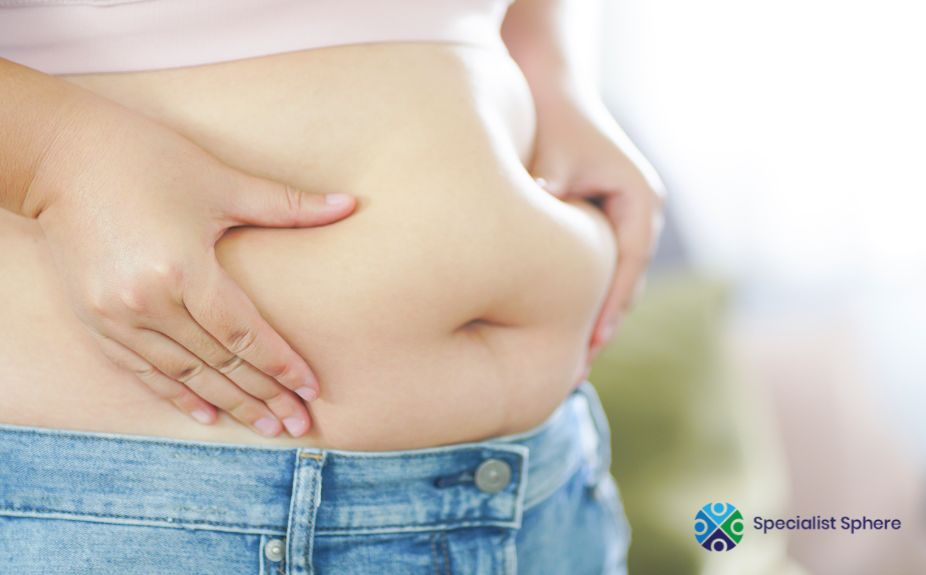Bloating is a common condition that can leave your stomach feeling full, tight, and stretched. It’s often caused by trapped gas in the digestive tract. Gas gets into your system in two primary ways: swallowing air and the breakdown of undigested food by gut bacteria.
What Causes Bloating?
Why Does My Stomach Feel Bloated?
Most stomach gas is a result of swallowing air while eating or drinking. While some of this gas is released through burping, the rest can travel to the large intestine, causing bloating and flatulence. The majority of the gas that causes flatulence, however, is produced when bacteria in the large intestine ferment carbohydrates that were not fully digested in the stomach and small intestine.
Common Causes and Risk Factors
- Swallowing Air: Chewing gum, drinking through a straw, and talking while eating can increase the amount of air you swallow.
- Dietary Choices: Certain carbohydrates are the main culprits. Protein and fat don’t produce much gas, but fats can slow down digestion and contribute to a feeling of fullness.
- Medical Conditions: Bloating can be a symptom of conditions like Irritable Bowel Syndrome (IBS), Inflammatory Bowel Disease (IBD), Celiac Disease, and food intolerances such as lactose intolerance. It can also be associated with constipation and, in rare cases, cancer.
- Lifestyle Factors: Pregnancy and being overweight can also increase the likelihood of experiencing bloating.
How to Get Rid of Bloating Naturally at Home
You can often reduce or prevent bloating with simple lifestyle changes and home remedies.
What are some natural remedies for bloating?
- Adjust Your Eating Habits: Eat slowly, chew your food thoroughly, and avoid talking while eating. Opt for smaller, more frequent meals instead of large ones.
- Modify Your Diet: Reduce or avoid carbonated drinks, chewing gum, and fermentable foods.
- Stay Hydrated: Drink plenty of water, especially if constipation is a factor.
- Exercise Regularly: Physical activity can improve digestion and help relieve constipation.
- Practice Relaxation: Yoga and other similar disciplines can help with relaxation and proper breathing techniques, which may reduce bloating.
When to See a Doctor for Bloating
What are the signs of serious bloating?
While occasional bloating is normal, you should consult a doctor if your symptoms persist or if you experience any of the following:
- Severe abdominal pain
- Blood in your stools
- Persistent diarrhea
- Unexplained weight loss
- Frequent vomiting
A medical professional can help you identify the underlying cause and recommend the most effective treatment
Preventing Bloating with a Low-FODMAP Diet
What is the best diet for bloating?
A low-FODMAP diet can be highly effective in preventing and managing bloating symptoms. FODMAP stands for Fermentable Oligosaccharides, Disaccharides, Monosaccharides, and Polyols. These are types of carbohydrates that are poorly absorbed in the small intestine and can be fermented by gut bacteria, leading to gas production.
| FODMAP Category | Examples of Foods to Limit |
| Oligosaccharides | Wheat, rye, onions, garlic, legumes, and certain nuts like pistachios and cashews. |
| Disaccharides | Lactose, found in milk and dairy products. |
| Monosaccharides | Fructose, found in honey, high-fructose corn syrup, and fruits like apples and pears. |
| Polyols | Artificial sweeteners, stone fruits, and some vegetables like mushrooms and cauliflower. |
This diet can be very restrictive, so it’s best to work with a trained dietitian to ensure you are getting proper nutrition and to tailor the diet to your specific needs, especially if you have other medical conditions.


